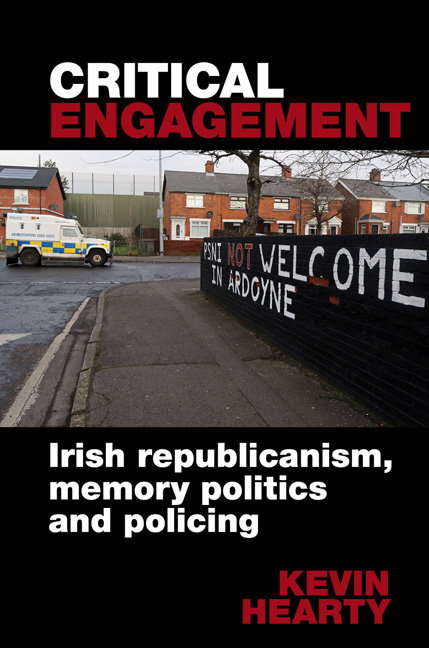Book contents
- Frontmatter
- Contents
- Acknowledgements
- List of Figures and Tables
- List of Abbreviations
- Introduction
- 1 Understanding a Fraught Historical Relationship
- 2 Irish Republican Memory as Counter-Memory
- 3 Ideology and Policing
- 4 The Patriot Dead
- 5 Transition, ‘Never Again’ and ‘Moving On’
- 6 The PSNI and ‘Community Policing’
- 7 The PSNI and ‘Political Policing’
- Conclusion
- References
- Index
5 - Transition, ‘Never Again’ and ‘Moving On’
- Frontmatter
- Contents
- Acknowledgements
- List of Figures and Tables
- List of Abbreviations
- Introduction
- 1 Understanding a Fraught Historical Relationship
- 2 Irish Republican Memory as Counter-Memory
- 3 Ideology and Policing
- 4 The Patriot Dead
- 5 Transition, ‘Never Again’ and ‘Moving On’
- 6 The PSNI and ‘Community Policing’
- 7 The PSNI and ‘Political Policing’
- Conclusion
- References
- Index
Summary
Introduction
This chapter critically examines how individual and collective memories of human rights abuses impacted on Irish republicans during the policing debate. In doing so, it examines the value that ‘remembering’ past abuses has for those constructing a politicised ‘never again’ mantra out of past experiences. This has seen increasing emphasis placed on accountability mechanisms and a belief that ‘critical engagement’ can prevent the repetition of past abuse through republican involvement in these bodies. Although this notion has been contested by Irish republican critics who continue to reject policing, those who have embraced ‘critical engagement’ have frontloaded aspects of accountability and human rights protection that stand in contrast to the policing of the past. In the absence of wholesale ‘forgetting’ of past human rights abuse, the chapter examines how individuals ‘move on’ in the aftermath of such abuse to engage in a new ‘working relationship’ with policing agents. Examination then turns to the issue of truth recovery. This leads to a more general discussion on perceptions of ‘victimhood’ within transitional Northern Ireland, where ‘official’ conflict narratives have largely excluded the Irish republican policing experience.
Human rights abuses
Conflicts are characterised by human rights abuses perpetrated by all parties involved. The North of Ireland was no exception. When examining the memory of past harm, one must remain cognisant of the fact that while Irish republicans suffered human rights abuses they also inflicted them. As such, they represent the collective ‘victim–perpetrator’. Given that conflict narratives silence ‘in-group’ wrongdoing, the memories recounted in this chapter generally lack reciprocity of Irish republican human rights abuses beyond a general acceptance of collective wrongdoing on a somewhat abstract level. This is premised largely on the fallibility of the combatant and the fact that all ‘sides’ commit wrongs during ‘war’. The ‘memory of perpetrators’, on the other hand, means British state human rights violations are amplified in individual and collective accounts. The master narrative constructed through interview data is largely inward-looking in terms of recognition of suffering rather than commission of harms. This is not to diminish the gravity of human rights violations foisted upon Irish republicans by the state; these were manifold and of considerable severity.
- Type
- Chapter
- Information
- Critical EngagementIrish republicanism, memory politics and policing, pp. 149 - 182Publisher: Liverpool University PressPrint publication year: 2017



